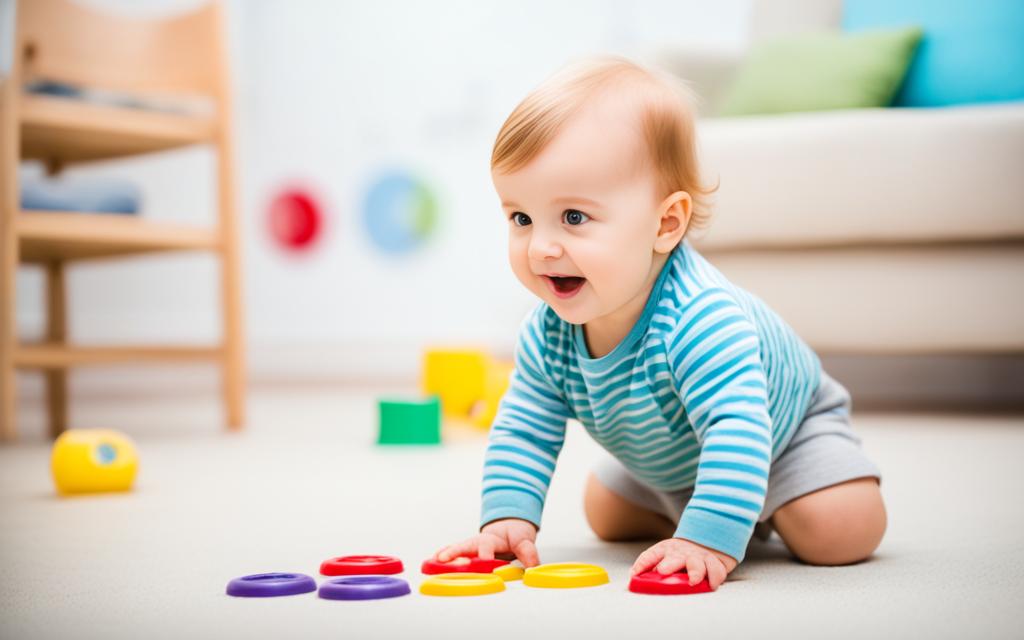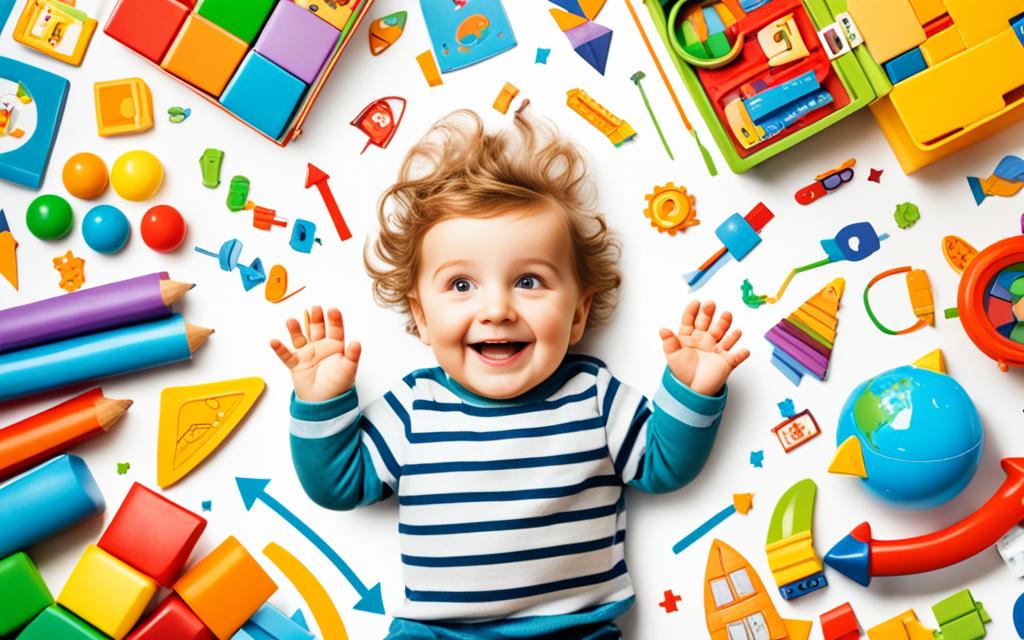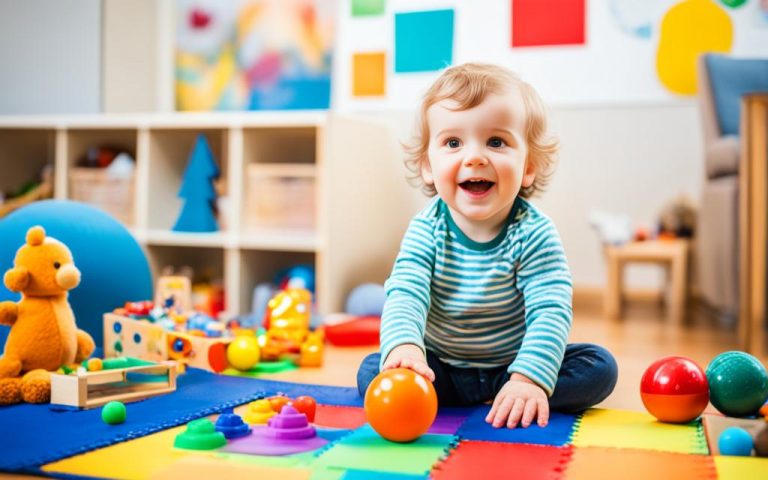Early Child Development and Care Essentials
Early childhood is a time of big changes and growth. It’s important to understand how early child development and care can shape a child’s life. This guide uses insights from child psychology to help you support your child’s growth.
Key things like growth milestones, good places to learn, and what they eat are vital. Knowing the psychological side to childcare will give you the tools you need. This will help you with your child’s early behavior and needs. Using these ideas, you can create a loving and supportive environment for your child.
- Recognizing key developmental milestones critical for monitoring growth and educational progress.
- Creating a nurturing environment that supports emotional, social, and intellectual development.
- Understanding the role of balanced nutrition in promoting healthy physical and cognitive growth.
- Applying child psychology principles to enhance attachment and behavior management strategies.
- Identifying and cultivating positive childcare practices that align with your child’s individual personality and needs.
The Foundations of Early Child Development and Care
Starting with the right foundation for early child development is key. It sets the stage for a lifelong journey of learning and growth. Elements like understanding developmental milestones, creating a nurturing space, and good nutrition are crucial. They help children grow effectively and with care.
Understanding Key Developmental Milestones
Each child is special, but there are milestones to track their progress. These include physical, social, emotional, and intellectual steps. Knowing these stages helps give the right support. Thus, ensuring your child reaches their full potential.
Importance of a Nurturing Environment
A caring environment is vital for children’s development. It’s about more than a safe space. It also includes emotional support. This helps build confidence, resilience, and a love for exploring. Such an environment aids in learning new skills and important social abilities for future accomplishments.
The Role of Nutrition in Child Growth
Nutrition is key for both body and mind development. A diet rich in nutrients boosts brain growth, strong bones, and a healthy immune system. These are big parts of a child’s growth. Starting good nutrition habits early leads to lasting health.
With focus on the above elements, you can provide a strong base for your child’s growth. Paying attention to these areas means not just ensuring well-being today. It also paves a positive path for your child’s future achievements and education.
Child Psychology and Its Impact on Childcare
Understanding child psychology is crucial for effective childcare. It shows us how children’s behavior and emotions change as they grow. We learn about the behavioral development and attachment styles that shape their early years.
Behavioral Development in Early Years
As a child grows, they learn social skills and how to react to the world. This early learning is vital for how they will interact with others later on. Knowing about these behaviors helps us give the right care and solve problems positively.
How Attachment Styles Shape Childcare Practices
Attachment styles are key in how children connect with those around them. From having a secure bond to feeling uncertain, each style impacts a child’s view on their care environment. By understanding these styles, caregivers can make sure each child gets the right emotional support.
Below is a comparison of how different attachment styles might influence behaviors and interactions in childcare settings:
| Attachment Style | Behavior in Childcare | Recommended Caregiver Approach |
|---|---|---|
| Secure | Comfortable with exploration, often initiates play | Provide consistent support and encourage social interaction |
| Anxious-Preoccupied | Clingy and less inclined to explore independently | Offer extra reassurance and gradually foster independence |
| Dismissive-Avoidant | Shows little emotion, prefers solo play | Engage actively, offering praise and demonstrating inclusivity in group activities |
| Fearful-Avoidant | Mixed behavior, can be unpredictable | Create a safe and predictable environment to build trust and stability |
Exploring Child Development Stages
Learning about child development helps you nurture a child effectively. It starts from infancy and goes up to the preschool years. Each stage brings important milestones in thinking, movement, meeting people, and getting ready to learn. We’ll look at what each stage involves and how to help.
Infancy: The First Year
In the first year, babies grow and learn a lot. They start to move, react to things around them, and build skills they’ll need later. They first learn to recognize faces, copy movements, and make sounds.
Toddler Years: Cognitive and Motor Skills Development
In the toddler years, kids really start to walk and talk. They explore everything around them. This is when their minds get really smart and they begin to solve problems and use words.
Preschool Age: Social Skills and Learning Readiness
Preschool kids focus more on fitting in with others and getting ready for school. They play and learn to share and follow rules. It’s a key time for them to get the basics of learning and being in a group.
Understanding the needs and steps of each stage helps you support your child in thinking, moving, making friends, and getting ready to learn. It’s key to helping them through each part of their growth with confidence and guidance.
Strategies for Enhancing Children’s Education
To boost your child’s learning, you need strategies that make learning fun and improve important skills. You should focus on children’s education with play-based learning, literacy skills, and numeracy skills. These areas really help your child learn better and enjoy learning.
Incorporating Play-Based Learning
Adding play to your child’s daily routine can greatly boost their education. It makes learning fun and meaningful. Kids naturally want to touch and explore things. Play lets them do this and learn as they play. This can be through simple puzzles or complex group games, all helping in different ways.
Promoting Literacy and Numeracy Skills
Starting early with reading and math skills is a key to later success in school. You can make these skills better by using them daily. For reading, read stories aloud and talk about them. This makes vocabulary and understanding grow. For math, do simple everyday counting and measuring. This makes numbers real and easier to understand.
By focusing on these key areas in children’s education, you set your child up for a bright academic future. Whether it’s through play, stories, or everyday math, the aim is to keep learning fun and continuous. This way, your child will stay curious and love learning for life.
The Importance of Early Childhood Learning Experiences
Early childhood learning sets the stage for a child’s future. It’s crucial for parents and teachers to understand this. These early years are about more than just learning to read and write. They’re about beginning a journey of growth through many experiences.
In the first few years of life, kids learn so much through play. Play helps their brains, emotions, and how they get along with others grow. Mixing with others and trying out different things each day makes a big difference.
Every moment of play is a learning opportunity, teaching skills that extend well beyond the playroom.
Think about the value in both structured and unstructured learning:
| Type of Learning | Cognitive Benefits | Emotional Benefits | Social Benefits |
|---|---|---|---|
| Structured Play | Improves problem-solving skills and supports cognitive development. | Boosts self-esteem through achievement. | Promotes cooperation and respect for rules. |
| Unstructured Play | Encourages creative thinking and flexibility. | Reduces anxiety and fosters a sense of freedom. | Helps in developing leadership skills and improvisation. |
It’s very important to provide varied learning experiences for young children, whether at home or in school. We need to find a balance. This way, kids will have a well-rounded environment that supports all kinds of growth. This helps build a strong base for future learning efforts.
- Integrate both alone time and time with others to boost personal and social skills.
- Support play that goes along with what children are interested in.
- Pick educational activities that fit each child’s special needs.
Making learning fun and interesting is key. It makes kids want to learn more as they grow.
Toddler Development: Transition from Infancy to Childhood
As your child enters the toddler stage, knowing about how your toddler grows is key. This stage sees big changes in how they socialize, learn to talk, and start shaping their behavior.
Socialization and Language Acquisition
Social skills and talking are vital in toddler years. They learn to talk better and make friends by talking and playing with others. It’s good to have stories, playdates, and games to boost their skills.
Managing Behavioral Issues
Toddlers can act out as they want more independence. Handling bad behavior includes having a routine, praising good actions, and explaining clearly what’s okay to do. By figuring out why your toddler is upset or acting out, you can guide them lovingly and patiently.
Knowing and acting early on these points are very important for a smooth journey through these big learning years.

| Development Area | Key Strategies | Expected Outcomes |
|---|---|---|
| Socialization | Regular playdates, family gatherings | Improved peer interactions, empathy skills |
| Language Acquisition | Storytelling, singing songs | Enhanced vocabulary and communication skills |
| Behavioral Management | Consistent routines, positive discipline | Reduction in tantrums, increased self-regulation |
Designing an Effective Preschool Curriculum
Starting to make an effective curriculum design for preschool means focusing on children’s diverse needs. A strong preschool curriculum helps kids develop in many different ways. It covers various educational areas to create a full learning experience.
An effective preschool curriculum should include reading, math, science, and art. It does more than just teach. It makes learning fun and encourages kids to be curious. It’s important to make sure the curriculum matches what preschool-aged children are ready to learn.
Here are some tips to meet those goals:
- Balance structured activities with hands-on learning opportunities to cater to the kinetic nature of preschoolers.
- Implement play-based methodologies that support cognitive and social development.
- Integrate storytelling and problem-solving exercises that promote literacy and numeracy skills.
When you’re designing your preschool curriculum, think about the whole child. It’s not just about academics. It’s also about helping kids grow socially and emotionally. Knowing what kids need helps create a place where all kids can do well.
Here’s how to fit a few key learning areas into your schedule:
| Learning Area | Goals | Activities |
|---|---|---|
| Literacy | Enhance vocabulary and comprehension | Storytelling, letter games, reading sessions |
| Numeracy | Develop basic counting and recognition of patterns | Counting games, sorting activities, basic puzzles |
| Science | Encourage curiosity about the natural world | Experimentation with water and sand, nature walks |
| Arts | Promote creativity and self-expression | Drawing, crafting, musical activities |
Creating an effective preschool curriculum takes work. It needs to keep getting better to fit kids’ needs as they grow. Watching how kids react and learn, and listening to feedback, helps you make the right changes. This keeps the curriculum exciting, inspiring, and just right for the kids it’s meant for.
Essentials of Infant Care for Optimal Development
When a newborn joins your family, knowing how to care for them is vital. It’s important for their optimal development. This guide will show you key steps to help your baby do well from the start.
The first step is to make them feel safe and loved. Everything you do helps shape their mind and feelings. By meeting their needs with love every time, you create a perfect place for them to grow.
- Feeding: Whether breast or formula, the food you give your baby is key for both body and mind.
- Sleep Routines: Setting a bedtime helps your baby sleep better, which is important for their health.
- Hygiene Practices: Keeping your baby clean and their space tidy helps keep them healthy.
- Nurturing Interactions: Touch, talk, and eye contact make your baby feel safe and loved.
These care steps do more than just keep a baby healthy. They build the foundation for good emotional and physical health, leading to optimal development.
Another important part is building a strong bond with your baby. Babies who form secure bonds are better at making friends and being independent as they get older. You can do this by always being there for them, listening and responding to their needs.
Keep these care steps in your daily routine. They’re essential for your baby’s growth and health. Remember, every little moment counts towards your baby’s future.
Choosing the Right Early Childhood Development Programs
Selecting the right early childhood development program is key for your child’s growth. It’s more than just childcare. These programs help your child develop fully, following high-quality standards.
Evaluating Quality and Standards of Care
Assessing a program’s care and education is vital. Check the staff’s qualifications, the safety of the place, and their teaching approach.
Programs Emphasizing Holistic Development
Holistic programs focus on more than just academics. They blend social, emotional, physical, and brain growth. This makes for well-rounded learning, offering both play-based and structured activities for all kids.
Here is a brief comparison table to help you decide between programs that focus on different aspects of development:
| Aspect of Development | Program A | Program B |
|---|---|---|
| Cognitive | Structured academic sessions | Interactive play sessions |
| Social | Group activities | Peer-learning sessions |
| Emotional | Guided emotional awareness discussions | Emotion-based role-play games |
| Physical | Scheduled physical education | Daily free-play outdoors |
Choosing a program that fits your child’s needs and your family’s values is crucial. It helps set a solid base for their future success.
Engaging with Your Child’s Developmental Journey
Being active parents is key to help your child grow. Knowing how to encourage their development is important. It helps them learn and adapt for life. You can make your home a place where learning thrives and work with their teachers and caregivers for a smooth journey.
Creating a Supportive Home Environment
A supportive home helps your child explore and learn. You should have things that make them want to learn. This can be toys, books, and other items just right for their age and abilities. These choices should spark their curiosity and joy of discovery.
Collaborating with Educators and Caregivers
Talking with their teachers and caregivers is crucial. Good communication is the key. It makes sure everyone is helping your child in the right way. Through regular talks and updates, you can better support their education.
| Strategies at Home | Collaboration with Professionals |
|---|---|
| Interactive play areas | Consistent updates from teachers |
| Educational toys appropriate to developmental milestones | Joint development of learning plans |
| Books and resources that promote learning | Attendance at workshops and seminars |
By focusing on a supportive home environment and working with educational staff, you can help your child a lot. Everything you do at home works well with what teachers and caregivers do. This gives your child a complete support system. It helps them succeed in school and grow in every way.
Early Child Development and Care: A Comprehensive Overview
Understanding early child development and care is key. It’s crucial to know how to give your child the best start. We’ll look at methods that put your child first in care.
Integrating Care Methods Across Different Stages
Keeping care methods consistent as your child grows is important. Babies have different needs than preschoolers. We must tailor our approach to match these needs.
Adapting to the Individual Needs of Your Child
Every child is unique, requiring a tailored approach. By noticing and responding to your child’s signals, you can create a supportive environment. This approach aids in their overall development.
Below is a detailed table showcasing the importance of care methods and how they can be adapted to the developmental stages of a child:
| Developmental Stage | Care Methods | Adaptations to Individual Needs |
|---|---|---|
| Infancy (0-1 Year) | Structured routines, sensory stimulation | Adjust sleep schedules, introduce textures based on comfort and curiosity |
| Toddlerhood (1-3 Years) | Language enrichment, motor skills development | Language games tailored to speech levels, choice in physical activities |
| Preschool (3-5 Years) | Social learning, basic academic skills | Group activities suited to social comfort levels, learning through play based on interests |
To really help your child grow, it’s about combining good care with understanding. This creates a supportive space. Your child’s needs should always be considered. This makes for a happier, healthier childhood.
Conclusion
In the first few years of a child’s life, what you do is super important. You can help them grow, learn, and be happy by focusing on early child development. This is your chance to really shape their future.
To support your child, it’s key to be involved in their learning. Work closely with teachers and those who look after your child. It’s important to pick the best programs that match your child’s needs. You want to make sure they feel comfortable and happy while learning.
Being excited and really putting in effort now will help your child in the long run. With the right development plans and working well with teachers, you’re building a great start for your child’s success and happiness. Keep learning, show care, and spend time with your child to help them be the best they can be.
FAQ
What are some key foundations of early child development and care?
Creating a nurturing environment is key. So is understanding developmental milestones. Proper nutrition is also critical.
How do I understand and track my child’s key developmental milestones?
Track key milestones by watching your child’s growth and progress. Look at motor skills, language development, and social interactions. Talk to experts like pediatricians for more help.
Why is a nurturing environment important for early child development and care?
A nurturing setting is vital for your child’s development. It supports emotional, social, and thought growth. It makes kids feel secure and encourages them to learn and build strong relationships.
How does nutrition impact a child’s growth and development?
Good nutrition helps your child grow strong and smart. It gives children the nutrients they need for their bodies, brains, and immune systems. This supports their overall health.
What is the role of child psychology in childcare?
Child psychology shows us how kids think, feel, and act. It helps us understand their development. This insight guides how we care for and educate children.
How does behavioral development in the early years impact childcare?
Early behavioral development shapes how children interact and express emotions. By guiding this development, caregivers help build a positive learning environment. This supports a child’s social and emotional growth.
How do attachment styles shape childcare practices?
Attachment styles form in early childhood. They affect how kids relate to others and deal with stress. Knowing these styles helps caregivers create a stable and loving environment.
What are the different stages of child development?
Child development happens in stages: infancy, toddler years, and preschool ages. Each stage has unique milestones, focusing on physical, thinking, and social skills.
What are some important milestones during the infancy stage?
Milestones in infancy include things like controlling their head, rolling, and sitting up. These lead to bigger steps like walking and talking.
How can I support my toddler’s cognitive and motor skills development?
Help toddlers through activities like building, puzzles, and play dough. Encourage them to explore and move. This supports both thinking and physical skills.
What social skills and learning readiness should I focus on during the preschool age?
In preschool, focus on skills like sharing and working with others. Help kids get ready for school by practicing reading, math, and solving problems.
How can I incorporate play-based learning into my child’s education?
Add play by giving them toys that they can use in different ways. Encourage make-believe and let them learn through doing. Play makes learning fun.
How can I promote literacy and numeracy skills in my child?
Boost literacy and math by reading and playing games. Use everyday things to learn numbers and letters. Offer books and learning tools that fit your child’s age.
Why are early childhood learning experiences important?
Early learning sets the stage for future success. It helps kids learn essential skills and enjoy learning. It also boosts creativity and problem-solving abilities.
How can I create a supportive home environment for my child?
Make your home safe and interesting for your child. Keep a regular routine and talk a lot. Create a happy and caring space.
How can I collaborate with educators and caregivers to support my child’s development?
Work with teachers and carers by staying in touch and involved. Go to meetings and share any thoughts. This helps everyone support your child together.
How do I choose the right early childhood development program for my child?
To pick the best program, consider the quality and approach. Think about safety and if it fits your child’s needs. It should match what you want for your child.
How can I engage with my child’s developmental journey?
Be a big part of your child’s learning and growing. Encourage them, listen to their ideas, and be there for them. Stay involved and support their progress.
How do I adapt care methods to meet my child’s individual needs?
Get to know what makes your child unique. Adapt how you care for them based on their interests and learning style. Stay open and adjust as needed to support their growth.







